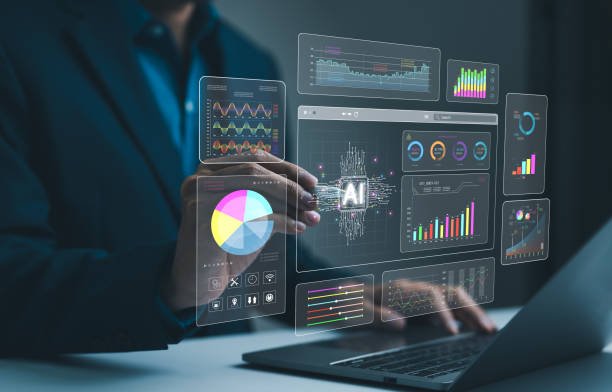Introduction
AI on Business Analytics has become a significant force in every field today. This technology is based on advanced systems and algorithms that can think and make decisions like the human brain. Business analytics is a process where businesses analyze their data to extract valuable insights for better decision-making.
The advent of AI has brought many revolutionary changes to business analytics. With AI, data analysis can be done with greater speed and accuracy.
By using machine learning algorithms and deep learning techniques, businesses can gain more meaningful insights from their data, which was previously challenging. These advanced analytics help businesses identify various trends and patterns, allowing them to improve their strategies and adjust according to market demands.
Role of AI in Data Collection and Management

Data collection and management are core aspects of business analytics. AI can automate data collection processes. Previously, businesses had to collect data manually, which was time-consuming and prone to errors. AI-driven tools now make real-time data collection and processing possible. For instance, AI-powered chatbots and automated data entry systems can record data accurately and efficiently.
Additionally, AI can streamline data management processes. Data integration and cleansing, traditionally complex and time-consuming tasks, have become easier and more effective with AI. Through these processes, businesses can organize and manage their data to prepare it for analysis.
Predictive Analytics and AI
Predictive analytics is the process where businesses attempt to predict future trends and outcomes. AI has ushered in a new era in this field. By using machine learning algorithms, AI can analyze past data to accurately predict future trends. This technology helps businesses adjust according to market trends and consumer behavior.
For example, retail companies can use AI to analyze consumer buying patterns and predict future purchases. This helps them optimize their inventory management and marketing strategies. Predictive analytics allows businesses to identify potential risks and opportunities, improving their decision-making process.
AI and Real-Time Decision-Making
Real-time decision making is critical for a business’s growth and success. Advancements in AI have made real-time decision-making more feasible and effective. AI-powered systems can analyze data in real time and provide instant insights.
With this technology, businesses can monitor their operations and take immediate action. For example, AI algorithms can optimize supply chain management, efficiently managing inventory levels and demand fluctuations. Real-time data analytics provides businesses with more accurate and timely information, enhancing their operational efficiency.
Customer Insights and AI

Customer insights are a crucial part of the decision-making process for businesses. With AI, businesses can analyze customer behavior and preferences to obtain more detailed and accurate insights. AI-powered tools analyze customer data to identify trends and patterns. These insights help businesses tailor their marketing strategies.
For example, AI can help design personalized marketing campaigns that align with customers’ specific preferences and interests. This improves customer engagement and satisfaction. AI-driven customer insights also help businesses better align their product offerings, boosting sales and revenue growth.
Risk Management and AI
Risk management is a critical component of business analytics. AI has made risk management processes more advanced and effective. By using AI algorithms, businesses can identify and mitigate potential risks. Machine learning models can analyze historical data to predict future risks.
For instance, financial institutions can use AI to detect and prevent fraudulent transactions. AI can also automate risk assessment processes, reducing human error and increasing accuracy. Advanced risk management techniques help businesses maintain financial stability and operational efficiency.
AI and Business Performance Monitoring
Business performance monitoring is an ongoing process where businesses track their performance metrics. With AI, performance monitoring can be made more comprehensive and accurate. AI-powered analytics tools analyze real-time data to identify performance trends. These tools provide actionable insights based on performance metrics.
For example, AI can accurately measure sales performance, customer satisfaction, and operational efficiency. This allows businesses to continuously monitor and improve their performance. AI-driven performance monitoring systems also help businesses identify growth opportunities and areas for improvement.
Competitive Advantage and AI
Competitive advantage is essential for a business’s success. With AI, businesses can make strategic decisions to stay ahead of their competitors. AI-driven analytics tools gather and analyze competitive intelligence, helping businesses adjust according to market trends and competitor strategies.
For instance, AI tools can analyze competitor pricing, product offerings, and marketing strategies, helping businesses optimize their own strategies. This aids in achieving market positioning and maintaining a competitive edge. To sustain a competitive advantage, businesses can use AI’s advanced capabilities to continuously evolve their strategies.
Challenges and AI Implementation
Implementing AI brings several challenges for businesses. The first challenge is data privacy and security. AI-driven analytics systems handle sensitive data, posing risks of data breaches and privacy issues. The second challenge is the accuracy and reliability of AI algorithms. AI systems need to be trained and optimized to provide accurate and reliable results.
Business owners must address these challenges during AI implementation. This requires following best practices and compliance requirements for AI. Effective AI implementation necessitates proper planning, training, and technology infrastructure.
Future Prospects and the Role of AI

AI is set to play an even more significant role in business analytics in the future. With advancements in technology, AI systems will become more sophisticated and capable. In the future, AI-powered analytics tools will enhance real-time data processing, advanced predictive analytics, and personalized insights.
Businesses will need to leverage AI’s evolving capabilities to optimize their strategies and operations. The integration of AI will make business analytics more intelligent and effective. With future prospects, AI will provide new dimensions and opportunities for business growth and success.
Conclusion
In this way, AI on Business Analytics has a profound impact on business analytics, revolutionizing every aspect from data collection, predictive analytics, real-time decision-making, and risk management to customer insights and performance monitoring. Businesses should embrace AI advancements to optimize their strategies and achieve a competitive edge and growth.





